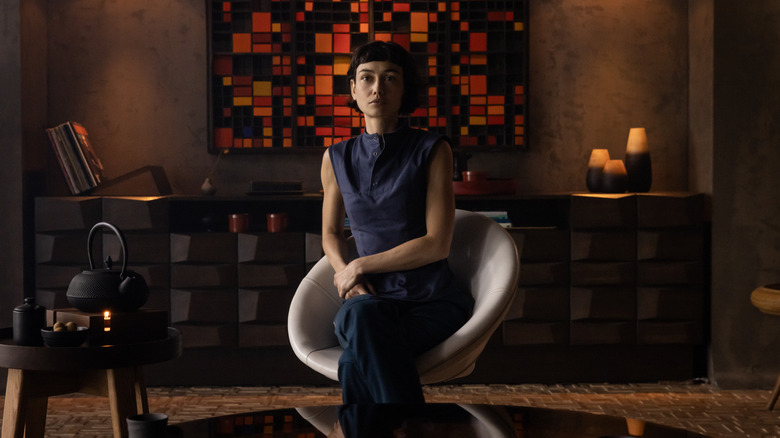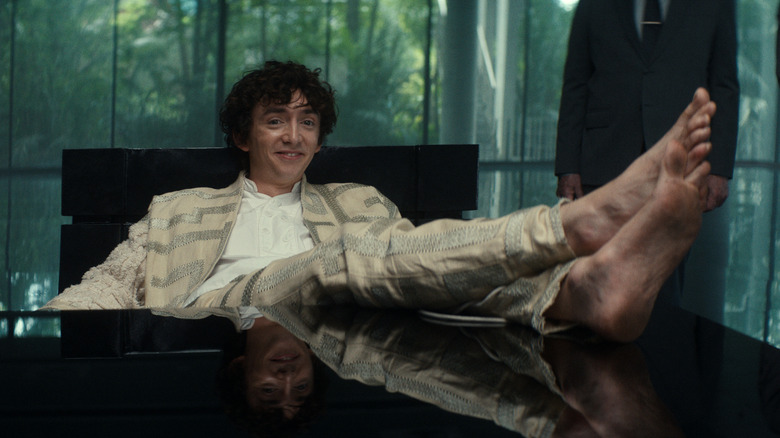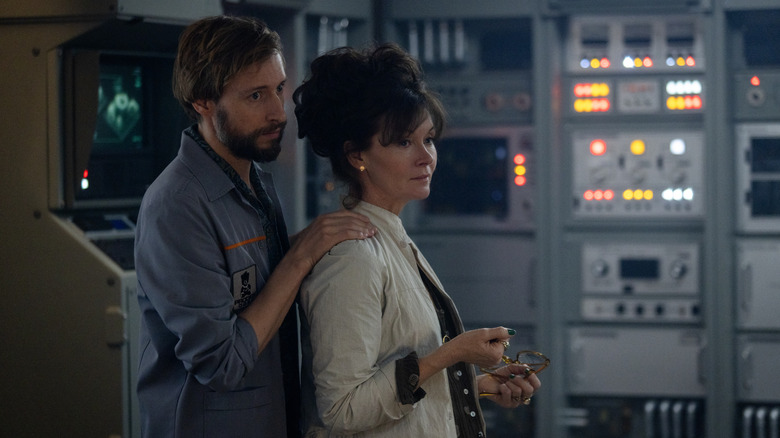Alien: Earth's Wild New Sci-Fi Tech Is Annoying, But That's The Point
"Alien: Earth" spoilers follow.
The core story of "Alien: Earth" isn't really about aliens at all. Rather, it follows the residents of a research facility owned by the Prodigy corporation, which is conducting experimental work transferring the minds of terminally ill children into immortal synthetic adult bodies. The result is a show starring grown actors behaving like prepubescent kids.
Inevitably some viewers are going to take issue with that choice. There's something innate in us that makes it frustrating to watch adults behaving like children, and the heavy-handed Peter Pan parallels in "Alien: Earth" don't help much. Some parts of the plot are certainly a bit annoying, but I'd argue that burden mainly falls on how Prodigy CEO Boy Kavalier (Samuel Blenkin) is written and directed. Your mileage may vary on the kids-in-adult-android-bodies part, but the lore of how this technology supposedly works is fascinating, and it actually makes any "annoying" moments from the kids part of the whole point.
See, as it's explained in the show, these new synthetic bodies don't generate any of the natural hormones or other chemicals that regulate things like mood swings or emotional responses in a human body. The technology only transferred the consciousness of the subject, not the brain itself. To compensate for this, the scientists at prodigy make artificial tweaks to the kids' neural functioning, meant to simulate real hormones and emotions. But of course, there are going to be places where your idea of how a child should feel clashes with the natural way humans behave. So whenever the text subjects in "Alien: Earth" suddenly get too distracted, unfocused, or silly, it's likely a result of overcompensation — artificial meddling to make them behave the way the scientists think children are supposed to act.
How does the mind-transfer tech in Alien: Earth work?
Obviously, we can't transfer someone's consciousness into an android body in the real world, so "Alien: Earth" has to keep things somewhat vague, like any good science fiction story. But we do learn a few key details about how the Prodigy tech works. We know that adult brains are "too rigid" to move, which is why all of the tests are conducted on children, presumably because of their greater neuroplasticity. We also know that while the subjects keep their memories, they don't carry the same degree of natural emotional connotations. When Wendy (Sydney Chandler) watches her brother CJ (Alex Lawther) on her video monitors, it seems to be with a more detached curiosity. However, when CJ is in real danger, Wendy almost sobers up, with even Boy Kavalier taking note of how much more human and emotionally sincere she seems.
The implication seems to be that for most of the time, the emotions and artificial hormones of the children are running on autopilot, set up a certain way by the Prodigy scientists. But when something really triggers a deep-seeded memory or emotional idea, their core consciousnesses appear to take over more directly.
This creates a really interesting scenario for the actors. Under normal circumstances, they're essentially playing simulations of kids, with some core personality traits and behaviors preset from their former, biological lives. That sort of thing is bound to annoy some viewers because it's invoking more stereotypes about how kids are, but it's also a fascinating idea. When under duress or pushed to their limit, the children become more true to their human selves.
The most alien thing about Alien: Earth is its obsession with parenthood
There's plenty of Xenomorph action in "Alien: Earth," but it doesn't necessarily feel of a piece with the movies. The focus is much more on the cyberpunk side of the "Alien" franchise, with the big plot lines grappling with the difference between biological humans, androids, cyborgs, and the new Prodigy hybrids. Where the series keeps its kinship with the movies most clearly may be in its thematic focus on birth and parenthood — something that's been a staple in the franchise since Ridley Scott's first "Alien" movie, from the violent impregnation of the xenomorphs themselves to the Nostromo's computer being called "Mother" (something that comes back in "Earth").
It's still too early in the series to tell exactly where these themes will go, but there are interesting dynamics. Boy Kavalier, the effective "father" of the children in their new bodies, is himself seen as some kind of child genius — the Peter Pan to their Lost Boys in the show's elongated metaphor — and it's unclear right now how old he actually is. The two scientists who lead the project, Dame Silvia (Essie Davis) and her husband Arthur (David Rysdahl), can't have children of their own, but they develop a strong relationship to their synthetic children in their synthetic bodies.
The tech corporation as substitute for a functional family unit is pretty dark, and it has a lot of potential for interesting storylines as "Alien: Earth" continues.


